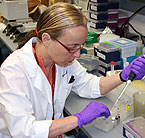Can My Computer Be Under Attack Without My Knowledge
CMV researcher Ravit Boger, in the lab.
Pediatric infectious disease specialist Ravit Boger is adamant about attacking cytomegalovirus, or CMV, the most common congenital infection in this country, afflicting around 1 in 150 newborns. Even though the virus is often silent with no signs or symptoms, she stresses that it leaves up to 15 percent of infected infants with devastating conditions like cerebral palsy and mental retardation. Also, CMV is the leading cause of sensorineural hearing loss in children, which cannot be medically or surgically corrected. Nor is there a treatment for pregnant women whose fetuses might be infected.
The solution, Boger explains, lies in the development of a vaccine to prevent or reduce the risks of severe outcomes. That's beginning to happen, she adds, but to develop a foolproof vaccine there needs to be a greater understanding of the genetics, the molecular mechanisms of the virus spread in the host, and transmission during pregnancy – subjects Boger has made the focus of her research. How many variants of the virus are there, and which ones pose more risks for the newborn? What genes and proteins are at play?
"Some congenital CMV infections end up with more severe handicaps," she says. "Why is that? We're trying to determine whether there is some genetic component of the virus associated with the more severe outcomes."
Using PCR (polymerase chain reaction) sequencing, Boger's lab is among the first in this country that characterized CMV genes. In collaboration with researchers in Alabama and Italy over the past decade, she has been evaluating the associations between these genes and outcomes. The research has ranged from the influence of TNFa and B-chemokine receptors in congenital CMV (J Infect Dis 2002: 186:1057-1064), to the association of CMV-encoded UL144 polymorphisms on CMV outcomes (J Infect Dis 2006;194: 464-473). In her most recent related study, Boger is also looking at host genes that may influence the response to a CMV vaccine comprising a glycoprotein B (gB) molecule. A recent phase II clinical trial showed that the CMV-gB vaccine was significantly but not completely effective in preventing maternal CMV; 8 percent of the patients showed evidence of infection on follow-up.
"Specifically, we're studying whether genetic variation in Toll-like receptors (TLR) could result in variable immune responses to CMV-gB vaccine," says Boger. "Identifying specific TLR variants associated with response to the vaccine will improve our understanding of vaccination strategies."
Boger is studying new therapies for infected newborns, too, because the current intravenous treatment, Ganciclovir, comes with serious side effects like neutropenia, which increases the risk of life-threatening infections. In a five-year multi-center trial that began in July 2008, Boger and fellow researchers hope to determine whether an oral form of the anti-viral drug, called Valganciclovir, will reduce side effects and improve outcomes. Boger stresses that the study is just underway and, with only six infants enrolled at Hopkins Children's and some two dozen infants at the other centers, the sample size is currently small. Nonetheless, she is not seeing as many side effects: "We're seeing some neutropenia, but at this point it's not significant." She adds, "Understanding the molecular epidemiology of this virus in conjunction with participating in a collaborative antiviral study group has been a great combination for me as a pediatrician. This research can have an impact."
Johns Hopkins' medical concierge services offer complimentary assistance with appointments and travel planning. Request free assistance:
All fields required *
Can My Computer Be Under Attack Without My Knowledge
Source: https://www.hopkinsmedicine.org/news/articles/Attacking-Cytomegalovirus